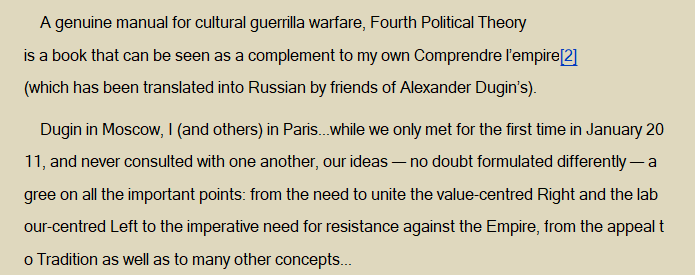Once relegated to the mere corners of some fringe political currents in Russia that nobody took seriously, we have had the misfortune of being subjected to Dugin in the English-speaking web thanks to the tireless efforts of the patsoc crowd, specifically the Infrared folks, who made it their mission to put communism and the revolution on hold to promote the word of Dugin.
With that in mind, and because I see some people uncritically accepting Dugin as this great figure to look up to (they never actually call him a Marxist) in the name of contrarianism, I figured I was gonna have to actually read Dugin. When the Internet was created and touted as a way to bring people closer together, I’m not sure this is what they had in mind.
Regardless, I have downloaded a PDF of Dugin’s foundational book, The Fourth Political Theory, and I can now look forward to a very good time for the foreseeable future.

Oh no what’s this

Oh shit shit shit

Oh fuck you at this point you’re just trolling


There’s the glimmer of an insight here, but it isn’t expressed well. A salient fact of liberalism is that it relates to the world purely in terms of abstractions (liberty, democracy, human rights, the atomized individual) which are not grounded in material reality – or, if they ever were grounded, were only so at a very specific moment in history. This is why liberals view as irrelevant the fact that the material base if clearly moving towards a socialistic mode of production, because in their view reality consists of manipulating a series of abstract words and concepts, almost like algebra. No previous ideology ever thought like this. Feudalism was consciously grounded in a set of paternalistic and communitarian property relations, and once it lost that grounding it also lost legitimacy in the eyes of the populace – they could see that an essential part of the feudal ideology was missing. Liberalism has similarly lost real material grounding, but it continues to maintain legitimacy, because it was always supposed to be separate and abstract.
During the 20th century, nearly all ideological thinking was to some degree infected by this liberal tendency to abstraction. You see this most clearly in fascism and anarchism, which attempt to remake society under the guise of an abstraction like “the race,” “the nation,” “the free individual.” But liberal abstraction had its pernicious effects even in countries like the Soviet Union and China; and it is in this removed sense that the 20th century can be called an “era of ideology.”
What happens when Marxism succumbs to abstract, moralistic thinking? You get, generally, either ultraleftism or right deviation. These two tendencies are actually similar in that they both try to make the material world conform (by sheer force of will) to some preconceived moral notion. The USSR in its late, right-deviationist phase reduced socialism to a set of phrases; the government thought, erroneously as we now see, that it could maintain socialism as a sort of “moral center,” regardless of the destruction of its material base. China under the Gang of Four tried to advance society politically without advancing it materially. Dengism in China, and the Juche Idea in Korea, represent the decisive defeat of liberal moralistic thinking, and full return of material analysis into Marxism. Dengism views the productive forces, as physically existing and evolving, as paramount in advancing toward communism. Juche grounds ideology in a proper understanding of humanity and its specific relation to (and difference from) the external world. Dugin, I think, makes a similar attempt, but it is confused, and suffers from the philosophical confusion which, we often think, was introduced into Russia during the Gorbachev, but actually has its origins in Krushchevite revisionism and the rejection of Stalin’s legacy.